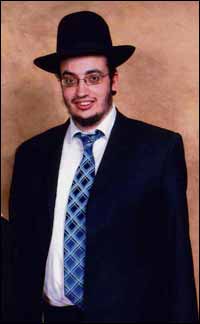|
PROFILE Yoel helps Judaism to rise from ashes in Germany - 70 years after Hitler | |
Under Communism, Judaism was again suppressed with generations of Jews coming into the world knowing nothing of their roots or heritage. But, fortunately, Jews and Judaism have a tendency to rise from the ashes. Nowhere is this more in evidence than in East Berlin where, 20 years after German reunification, a thriving Jewish community of fully observant Jews - most of whom were born to atheistic parents totally ignorant of their Jewish heritage - throngs the streets in sharp contrast to the gruesome Stumbling Stones and other memorials to German Jews who perished during the Holocaust. This miraculous revival owes its inception to an American multi-millionaire. The son of beauty magnate Estee Lauder, Ronald Lauder established the Ronald S Lauder Foundation in 1987 while he was American ambassador to Austria. The aim of the organisation was to rebuild Jewish communities in Central and Eastern Europe. With the fall of the Iron Curtain, the German government - eager to atone for its Nazi past - offered generous resettlement packages to Jews who were pouring out of their Communist prison. Germany is now home to 200,000 Jews, most of whom have had virtually no Jewish education or awareness. To fill this void 10 years ago, the Lauder Foundation sent an American rabbi and his wife to establish a Jewish outreach organisation in Germany. Based in Berlin, Rabbi Joshua Spinner began attracting assimilated Jewish youngsters to his summer and winter camps. As the camp participants began to exhibit an irrepressible desire to learn more about Judaism, a yeshiva was established in a Jewish community-owned building in East Berlin, which, prior to World War Two, had housed a Jewish school. The yeshiva proved such a success that four years ago a Glasgow Kollel member was brought in to provide an advanced centre for Jewish learning for yeshiva graduates who had married and wished to continue their Jewish studies. The aim of the kollel was to build a Torah-observant Jewish community in the upmarket East Berlin suburb of Prenzlauer Berg, which had no other Jewish inhabitants except for those connected with the yeshiva. The young man chosen for the pedagogic outreach task of community building was one whose background was ideally suited to the task in hand. Rabbi Yoel Smith is the son of the late Chief Rabbi of Lithuania Rabbi Dovid Smith, whose first contact with Torah-starved Soviet Jews came on the day of Lithuanian independence in 1989 when he was appointed Chief Rabbi by its president Vytautas Landsbergis. Along with his 10 siblings, Yoel had earlier been brought up to share his Shabbat meals with non-religious guests - long before such religious outreach became fashionable. His Manchester-born father also used to organise choc mint receptions for the religiously unaffiliated in London's West End hotels. He also wrote pamphlets against intermarriage. The outreach tradition continued to the next generation with Yoel's sister Esther Zamoire, of Antwerp, forming SEED Belgium in her father's memory and another sister Gila Ross and her husband Rabbi Samuel Ross working with unaffiliated Jewish youth in Calgary, Canada. After studying in yeshivot in Gateshead and South Fallsburg, USA, and marrying Manchester-born Chaya Meryl Gordon, Yoel gained his first personal taste of religious outreach work in his more that six years at Glasgow Kollel, from where he used to regularly officiate at Langside Hebrew Congregation. But however much he enjoyed his time in Scotland, Rabbi Smith is much more excited about his work in East Berlin. He said: "Most of my students, who come to the yeshiva between the ages of 16 and 22, knew nothing about Judaism. "They were starting from fresh and had a tremendous thirst for religious knowledge. It tugged at my heart and is very exciting." He continued: "Religious outreach work is especially important in Germany where, before the Lauder Foundation came, 200,000 Jews - mainly of Soviet origin - were untouched by any Jewish organisations. "Although when I first arrived it felt awful to see the Stumbling Stones and the memorials to the Jews who were killed by the Nazis, we have an obligation to help those Jews now living in Germany. "If no one came here there would be complete assimilation." And although the streets of the fashionable East Berlin suburb are now teeming with Jews dressed in traditional garb, Rabbi Smith says he has experienced no antisemitism. He says: "The Germans are very proper and nowadays the proper thing for Germans to do is to treat Jews well." When Rabbi Smith arrived to start the kollel six years ago, there were only six married couples in the suburb, including him and his wife and fellow staff members and their spouses. But the numbers quickly grew after a Lauder Foundation Midrasha girls' seminary was moved to East Berlin from Frankfurt. This institution often serves as a fertile provider of marriage partners for yeshiva students. Rabbi Smith said: "During the first year I was there we had 13 weddings". The married students enter the kollel before moving on and getting involved in outreach work. After gaining semicha from Dayan Ehrentreu of the London Beth Din, graduates have taken up rabbinical and educational positions in Cologne, Leipzig, Vienna and Potsdam. As the number of married students attending the kollel grew and they had children - Rabbi Smith and his wife have three of their own - so the newly-built community needed Jewish educational institutions to provide for their needs. Rabbi Smith, who two years ago took over the running of the yeshiva, says proudly: "We now have 40 families with 35 children who attend a kindergarten and primary school." And with such enthusiasm from both students and staff, it looks as if East Berlin Jewry is set to grow and grow to prove to the world that Judaism can thrive on the very ashes of the Holocaust.
|
